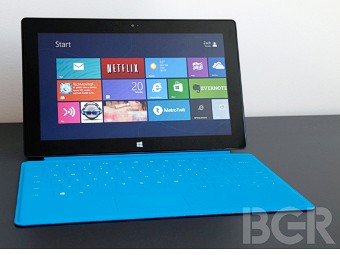

Microsoft's new Surface tablet kicks off its Windows 8 push -- the biggest risk Microsoft has taken in decades. BGR executive editor Zach Epstein put it to the test.

When Microsoft (MSFT) unveiled the Surface tablet in June, it pulled back the curtain on nearly three years of secret development. This Friday, buyers will finally be able to get their hands on the $499 tablet.
The Surface has two goals: Challenge Apple's iPad, and lay the foundations for a Windows 8 empire that will stretch across the full spectrum of devices, from touchscreen phones and tablets to laptops and traditional desktop PCs.
Apple's (AAPL) hallmark is gadgets that are sleek, intuitive and made with high-end materials -- not Microsoft's traditional strengths. Can the Surface compete?
Let's start with the hardware. At 1.5 pounds, the Surface's weight is comparable to the iPad's, despite the Surface's larger display.
Microsoft used a process it calls "VaporMg" (pronounced "Vapor Mag") to mold magnesium and other materials at dimensions as thin as 0.65 millimeters. The result is remarkably strong and durable -- know of any other tablets you can ride around like a skateboard?
The VaporMg finish is difficult to scratch -- maybe Apple should license it for future iPhones -- but the dark material tends to pick up fingerprints very easily. A few quick swipes with a cloth or T-shirt cleans it right up.
The Surface's face is covered with Gorilla Glass 2, a thinner, lighter version of Corning's most durable mass-market glass.